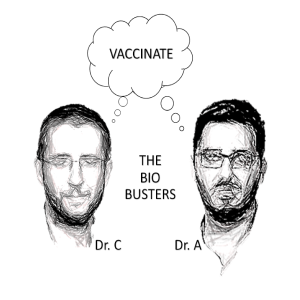Episodes

Thursday Oct 11, 2018
Episode 6 - Bizarre Animal Reproduction
Thursday Oct 11, 2018
Thursday Oct 11, 2018
Show notes:
In the show, The Bio Busters professors, Dr. A and Dr. C, discuss with Conservation Biology Senior Grant Milne about some of the more peculiar reproductive mechanisms in the animal kingdom. Reproduction plays an important role in the diversity and speciation of animals that evolve over time and pass traits to offspring. From platypuses and their unique brood care, to some freaks in the sheets (bedbugs), we touch on a broad range of reproductive strategies in animals that stray dramatically from what we consider the norm. Keep the discussion and comments going on the iTunes review section, or feel free to e-mail the podcast with future show ideas and thoughts on the current show.
Music by Bahaa Naamani
Email us at thebiobusters@gmail.com
References:
Angeloni, Lisa. “Sexual Selection in a Simultaneous Hermaphrodite with Hypodermic Insemination: Body Size, Allocation to Sexual Roles, and Paternity.” Animal Behavior, vol. 66, 2003, pp. 417–26, doi:10.1006/anbe.2003.2255.
Balcombe, Jonathan. “Sex Lives of Fish.” Natural History, vol. 124, no. 8, Sept. 2016, pp. 22–27.
Hawkins, Margaret, and Adam Battaglia. “Breeding Behavior of the Platypus (Ornithorhynchus Anatinus) in Captivity.” Australian Journal of Zoology, vol. 57, no. 3, Oct. 2009, pp. 283–93.
Kamimura, Yoshitaka, et al. “Duplicated Female Receptacle Organs for Traumatic Insemination in the Tropical Bed Bug Cimex Hemipterus: Adaptive Variation or Malformation?” PLoS ONE, vol. 9, no. 2, Feb. 2014, pp. 1–9. EBSCOhost, doi:10.1371/journal.pone.0089265.
Martin, Peer, et al. “The Parthenogenetic Marmorkrebs ( Malacostraca: Decapoda: Cambaridae) Is a Triploid Organism.” Journal of Zoological Systematics & Evolutionary Research, vol. 54, no. 1, Feb. 2016, pp. 13–21. EBSCOhost, doi:10.1111/jzs.12114.
Scholtz, Gerhard, et al. “Ecology: Parthenogenesis in an Outsider Crayfish.” Nature, vol. 421, no. 6925, Feb. 2003, p. 806.
Streit, Adrian. “How to Become a Parasite without Sex Chromosomes: A Hypothesis for the Evolution of Strongyloides Spp. and Related Nematodes.” Parasitology, vol. 141, no. 10, May 2018, pp. 1244–54, doi:10.1017/S003118201400064X.


6 years ago
Very informative topic. I commend you for welcoming your students onto your podcast: such inclusiveness reflects once again your academic maturity. You are true academic mentors, and that is leadership. Keep up the good work!